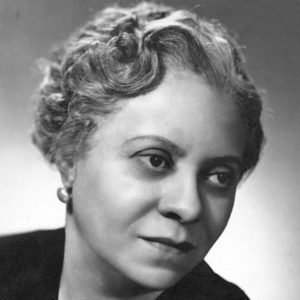
Cabaret
In the Detroit techno world, a cabaret is a type of social gathering usually associated with a community of unionized workers or other socially specific
After research about Mahalia Jackson through books and several scholarly sources, it became obvious that Jackson’s role as the “Queen of Gospel” is very multifaceted. From this title, I attempted to unpack the different qualities, both personally and professionally, that led to her widespread success and fame. By unpacking and understanding her life and experiences, it can be seen how her experiences impacted her music career and development as a Godly woman, which increased her ability to reach a wide array of audiences.
Gospel music is widely known for the inspirational and uplifting messages it provides, especially to those from a religious or spiritual background. One of the most well-known gospel singers, Mahalia Jackson, is revered as the Queen of Gospel. From her early childhood in New Orleans to her musical career that took her on international tours, she has undoubtedly been a strong pillar to the gospel music we have and love today. Mahalia Jackson is rightfully considered the “Queen of Gospel” and has a long-lasting, successful legacy due to her strong will and self-knowledge and awareness, musical capabilities, and uplifting spirit.
Mahalia Jackson was born on October 26, 1911 in New Orleans, LA. In 1917, her mother passed away, and Mahalia Jackson was raised by her aunt. Her early life greatly mirrored the current picture of poverty painted in New Orleans. She was raised in a small shot gun house with the rest of her family. The music of New Orleans in this time period encompassed jazz, blues, and ragtime music. Although this was the famous music of the time, Jackson came from a very spiritually grounded family. She grew up in church, and her family considered genres of music outside of gospel as secular, worldly, and evil. Although her family felt this way, Mahalia Jackson did not feel this way toward other genres of music. Whenever she could, she would sneak away and listen to Bessie Smith, a famous jazz singer of the time, through her cousin Fred’s record player. Her choice to sing gospel music did not strip the influences of secular music from her style (Jabir 2009). Growing up in New Orleans greatly influenced her musical style and “bluesy” gospel sound. When asked about the influence of her early childhood church experiences on her music, Mahalia Jackson had this to say:
I know now that a great influence in my life was the Sanctified and Holiness churches we had in the south…Those people had no choir and no organ. They used the drum, the tambourine, and the steel triangle…They had a beat, a powerful beat, a rhythm we held on to from slavery days…I believe that the blues and jazz and even the rock and roll stuff got their beat from the Sanctified church.
At the age of sixteen, Jackson moved to Chicago in pursuit of more opportunities. Her life experiences and career as an artist developed into her character. At the onset of her career, her music met great opposition from the church. In this era, Black churches in Chicago were seen as a “mechanism by which blacks could be made into respectable (Protestant) citizens” (Jabir 2009). In line with the idea of creating respectable citizens, the church functioned as a “Black Protestant project” where Black choirs were directed by classically trained musicians. This lead to the sound of Black church choirs in Chicago being that of European classical choral music and arranged spirituals (Jabir 2009). Determined not to be deterred from her way of singing by the rigid views of the church, Mahalia Jackson searched for a church that spoke to her soul spiritually and musically. She united with the Greater Salem Baptist Church. Soon after, she auditioned for the choir and became a lead singer. Soon after, she joined a quintet singing group that performed throughout the city. This was the beginnings of what would launch Mahalia Jackson into her career. In 1934, she received $25 for her first recording, God’s Gonna Separate The Wheats From The Tares. These experiences of oppositions in the church forced Jackson to discover what she wanted her sound to be. She had to make a decision. Would she let the opposition of the church force sway her from adding the swing and blues styles that she carried in her spirit from her childhood experiences in New Orleans or continue on despite the criticism? She decided to continue singing in the style she loved, which shows her perseverance and strong will to stand for what she believes. This determination never left, even as she faced temptation to sing the blues instead of gospel music.
The issue of gospel artists attempting to make more money by crossing over has been an historic issue in the gospel music industry and Jackson was not immune. During The Great Depression, families across the country experienced devastating impacts. Mahalia Jackson knew that she could earn more money by singing sings outside of the gospel genre. This idea created an internal conflict for Jackson. During her childhood, she was always enchanted with the swing and blues style of music but never pursued it due to her faith and the ideas of her religious family. Mahalia Jackson’s internal conflict was resolved when her grandfather, to whom she was extremely close, was left comatose after suffering a stroke. In that moment Jackson made a vow that if her grandfather recovered, she would never enter a theatre again, let alone sing songs her grandfather would not approve of. As her career progressed, she never turned back on her vow, constantly turning down lucrative night club requests. A Las Vegas night club offered her $25,000 to sing, and even offered not to serve alcohol at the show. Jackson still stuck to her vow despite the large amount of money offered, which speaks volumes to her character and integrity as a musician and a Christian. When asked why she does not sing the blues, Jackson simply stated that her inspiration came from gospel and not blues music:
There’s no sense in me singing the blues, because I just don’t feel it… In the old, heart-felt songs, whether it’s the blues or gospel music, there’s the distressed cry of a human being. But in blues it’s always despair; when you’re done singing, you’re still lonely and sorrowful. In the gospel songs, there’s mourning and sorrow, too, but there’s always hope and consolation to lift you above it.
Her title as the Queen of Gospel became a testament to how she lived her life for God’s glory both on and off the stage. Along with Thomas Dorsey, who was considered the Father of Gospel, Jackson performed at various churches in the area and performed in gospel tents. By performing with such a renowned composer, Jackson’s as a gospel singer grew. After touring with Dorsey, she returned to Chicago to open her own beauty salon and floral shop. Through her small business, she was able to draw a wide range of customers from the gospel and church communities, even while she was not making music. She was known to always offer supportive and encouraging words to her customers, captivating her fans both on the stage and off. On the side, she continued to make records but they were of very little monetary gain. One day, while she was practicing in a studio, a representative from Decca records overheard her and advised her to record a spiritual she learned as a child, Move On Up a Little Higher. The record sold like wildfire, selling 100,000 copies overnight and quickly passing the two-million mark. The Negro press soon hailed her as the “only Negro who Negroes have made famous.” During that time period, it was not very often that an artist, especially an African American, was made famous on such a large scale, by solely the African American community. However, this was the case with Jackson, and her name became a staple in the history of gospel music.
Upon beginning to tour again, Jackson was willing to do whatever it took to ensure that she was able to share the gospel. She rented a Cadillac that she slept in whenever her tours brought her to places where hotels would not allow blacks to lodge. She also stored food in the back of the Cadillac so that she could have food to eat whenever she encountered restaurants that refused to serve blacks. No matter the venue, geographical location, or audience, there was one thing about Mahalia that remained the same: she stayed true to who she was and whose she was during every performance. While performing to a packed house of white and black patrons at Carnegie Hall, Jackson recounts how she got carried away with the jubilant audience (some would say she was caught up in the Spirit). She cites that she found herself on her knees singing for them, and she had to straighten up and say “Now we best remember that we are in Carnegie Hall and if we cut up too much, they may put us out.” This funny statement, in all its authenticity, only captivated her audiences even more. It is also interesting to note that phrases like these continue to dominate in the Black church setting. This demonstrates that she was not ashamed to let the Spirit use her and to be caught up in the Spirit during her performances. Her ability to perform from her true and genuine self made her equally as popular internationally as she was here in the United States. She performed for royalty and fans in France, England, Denmark, and Germany. She was also able to sing to groups of mixed religions, including Jews, Christians, and Muslims. From the current optic of present day America where it seems virtually impossible for people of different denominations, yet alone different religions, to come together and be on one accord, this is tremendous. This shows not only her capabilities to captivate her audiences, but how she constantly placed God first in her life, allowing her to be wildly successful and reach millions of people.
She was not only known on stage and in her community, but she is also viewed as an iconic member of the Civil Rights Movement. Not only was she an active participant, but Jackson’s voice was a highlight of one of the most major events of the movement. She sang at the historic March on Washington, right before Martin Luther King Jr. gave his famous “I Have A Dream” speech. The Civil Rights Movement and the Black church were intertwined, leading to the theme of many Baptist and Missionary Baptist churches having a social justice theme. Jesse Jackson says that Mahalia Jackson’s voice became the voice of the Civil Rights movement. She sang at the Presidential Inauguration of John F. Kennedy and also sang at fundraising events for the African American freedom struggle. No matter how grand of a stage her voice took her, she never hesitated to show up when called upon by her friend Martin Luther King Jr. to sing for the fight for freedom. Through everything Mahalia was able to achieve and the amazing spaces her career took her, she continued to have a humble spirit. Jackson considered herself a “simple woman: she enjoyed cooking for friends as much as much as marveling at landmarks around the world.”
When Mahalia Jackson died, her legacy left an imprint not only on gospel, but the world. Decades later, she is still remembered as a shining beacon of light for the Civil Rights Movement. Her music has been known to “break down some of the hate and fear that divide the white and black people in this country” (NPR). Not only is she recognized in museums and still paid homage to internationally, but her spirit lives on in new gospel artists. Joshua Nelson, a young black Jew, was first introduced to gospel by Mahalia Jackson. As a singer himself, he was greatly inspired by her life and work. He set out to change the way traditional services were held in the Jewish religion. He felt they were too boring, and set out to infuse music styles similar to that of Mahalia Jackson.
In conclusion, Mahalia Jackson’s title as the Queen of Gospel was not just about her ability to sing well and her success nationally and internationally, it was about who she was a person. She lived her life the same way in and out of the spotlight: full of passion, love, laughter and light. She never compromised herself, her faith, or her values for monetary gain and used her gifts for the Lord. She had a strong sense of who she was, had tremendous music capabilities, and had a spirit that could uplift people both on and off the stage. This is why she is rightfully named the Queen of Gospel and a strong legacy.
Best, Wallace. “Gospel According To . . .” Harvard Divinity Bulletin. 2006. Accessed September 30, 2017. https://bulletin.hds.harvard.edu/articles/spring2006/gospel-according.
Glinton, Sonari. “Mahalia Jackson: Voice Of The Civil Rights Movement.” NPR. February 08, 2010. Accessed September 30, 2017. http://www.npr.org/templates/story/story.php?storyId=123498527.
Jabir, Johari. “On Conjuring Mahalia: Mahalia Jackson, New Orleans, and the Sanctified Swing.” American Quarterly 61, no. 3 (2009): 649-69. http//www.jstor.org/stable/27735012.
“Jackson, Mahalia 1911–1972.” Contemporary Black Biography. . Encyclopedia.com. (October 16, 2017). http://www.encyclopedia.com/education/news-wires-white-papers-and-books/jackson-mahalia-1911-1972
“Mahalia Jackson.” The Black Perspective in Music 1, no. 2 (1973): 198. http://www.jstor.org/stable/1214481.
Oppenheimer, J. (2006, Jan 06). Gospel truth; Joshua Nelson aims to inject some spirit into Jewish prayer services. Baltimore Jewish Times, 288, 57. Pannellctp Traditional Gospel Music. “The Story of Gospel Music: The Power In The Voice (1998).” YouTube. January 15, 2016. Accessed September 30, 2017. https://www.youtube.com/watch?v=iC0rg0LywHw.
Reed, Roxanne R. American Music 24, no. 3 (2006): 376-78. doi:10.2307/25046042.
1. She was known for her outstanding cooking capabilities. She made everything from soul food and catfish stew to succotash.
2. She grew up in a shotgun house shared with 13 other people.
3. Mahalia Jackson was her stage name, not her birth name. She was born Mahala Jackson.

In the Detroit techno world, a cabaret is a type of social gathering usually associated with a community of unionized workers or other socially specific

Title: Mahalia Jackson: Queendom Declassified OUTLINE Research Methodology: After reading about Mahalia Jackson both in the textbook and through several scholarly sources, it became obvious

Music, especially in the African American community, has been a central part of life. Music marks major life events, transitions, and celebrations. In the African

His Life Smokie Norful, born as Willie Ray Norful, Jr., is a pianist and gospel artist. He spent his early life in Tulsa and Muskogee,

Background Florence Price was a classical music composer born to a mixed race family that was real respected despite the racial tensions of the time

Login to your account